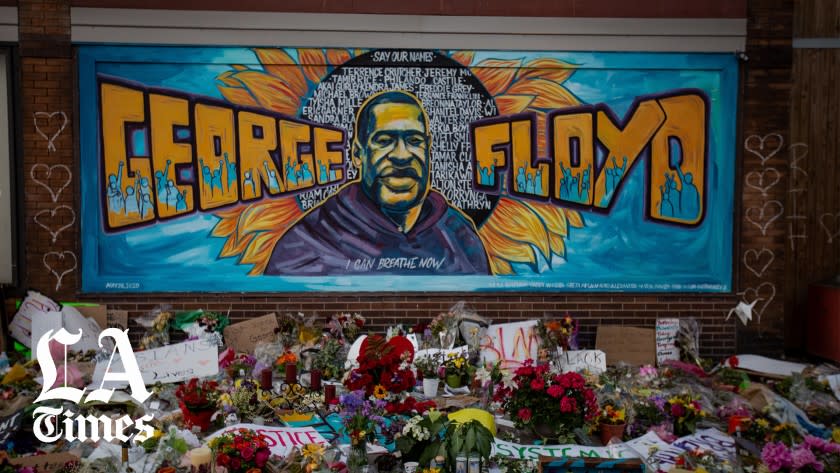Granderson: What's changed one year after George Floyd's murder?

- Oops!Something went wrong.Please try again later.
- Oops!Something went wrong.Please try again later.
I’ve been thinking about this column every day for the past 365 days because I’ve been thinking about the death of George Floyd every day for the past 365 days. Every day since I first learned his name. Since I first saw that video.
I watched my mother pray for justice each day of the Derek Chauvin trial. A guilty verdict was satisfying, but she would be the first to tell you that verdict alone did not answer her prayers.
Like many Black folks, my mother relies on prayer to help her go on because horrors like the murder of George Floyd won’t allow her to move on. She first left her home state of Mississippi more than 50 years ago because her parents, my grandparents, feared for her life.
Earlier this year, as we planned a road trip to visit family there, we were trying to map out a course less likely to take us through Ku Klux Klan territory.
We concluded there wasn’t one.
So, if you came here hoping to read a column celebrating all the wonderful things that have come in the wake of Floyd’s death you should probably look elsewhere.
I’m not there yet.
And to be quite honest, neither should you be.
In 2019, Louisiana state troopers initially told Ronald Greene’s family that Greene died immediately after crashing his car into a tree following a high-speed chase. Later, the police said Greene struggled with troopers before dying on the way to the hospital. Last week, the Associated Press obtained video showing that not only did Greene survive the crash, he apologized repeatedly to the officers for fleeing as he was surrendering.
Didn’t matter.
Greene was tased. He was dragged on the ground. Beaten. Greene can be heard saying, “I’m your brother! I’m scared! I’m scared!” An officer can be heard saying, “I hope this guy ain’t got f— AIDS.”
One of the troopers involved, Dakota DeMoss, was also one of the four officers arrested in February on charges of using excessive force in an unrelated case. Last May, DeMoss struck that person with his knee, slapped him in the face and then turned off his body camera. In a group chat with the other officers, DeMoss texted, “Bet he don't even cross into LA anymore.”
As of last week, DeMoss was still on leave.
We’re going to need more than 365 days to reform all of that.
And then there’s the poll CBS News conducted shortly after Chauvin was found guilty of murder. One in four Americans thought the verdict was wrong. Nearly a third of white people thought the verdict was wrong. Almost 50% of Republicans thought the verdict was wrong.
Keep in mind this isn’t the O.J. Simpson trial we’re talking about here — a case juxtaposing forensic evidence and testimony with a person’s worldview and lived experiences. No, we all watched Chauvin kill Floyd in broad daylight in front of witnesses begging him to stop.
Yet Tucker Carlson, the most popular personality on Fox News, said the man who placed his knee on Floyd’s neck for 9 minutes and 29 seconds was “a sacrifice for the sins of a nation.”
A “sacrifice” — as if he were an innocent lamb brought to the slaughter and not the public servant who casually placed his hand in his pocket while the human being underneath him begged for his life.
The way Greene can be heard begging for his life in the recently released video from 2019.
The way Diamond Reynold’s then 4-year-old daughter can be heard begging her mother to calm down “because I don’t want you to get shooted.” Reynolds, who in the video was handcuffed and in the back of a squad car, was distraught because a Minnesota police officer had just shot her boyfriend, Philando Castile, five times, killing him. Castile was initially pulled over for a broken taillight.
Louisiana state police still have not revealed why Greene was initially stopped. An example of why my mother and I were using Google to create a 2021 version of “The Negro Motorist Green Book.”
Malcolm X once said, “If you stick a knife in my back nine inches and pull it out six inches, there’s no progress. If you pull it all the way out, that's not progress. The progress is healing the wound that the blow made and they haven't even begun to pull the knife out; … they won't even admit the knife is there."
For 365 days I have been thinking about George Floyd because that knife won’t let me move on. I can feel it twisting each time I’m reminded the system did not work, the video worked.
The system in Minneapolis initially failed to mention that Chauvin put his knee on Floyd’s neck for nearly 10 minutes. The system in Louisiana told Greene’s family he died in a car accident. The system in Chicago said Laquan McDonald charged at the police with a knife, but the video showed McDonald walking away. In South Carolina, only after a bystander’s video showed that Walter Scott was shot five times in the back while fleeing a police officer was that officer arrested.
This is why I’ve thought about George Floyd every day for the past 365 days. This is why I’ll likely think about him every day for the next 365 days. Much to the detriment of our own mental health, Black folks have become quite adept at being able to press on, to go on.
I do still have hope that one day we’ll actually be able to move on. But for that to happen, for me to write in earnest about healing, that knife Malcolm X spoke about has to be removed from our backs.
@LZGranderson
This story originally appeared in Los Angeles Times.

